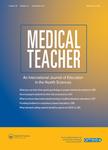版权所有:内蒙古大学图书馆 技术提供:维普资讯• 智图
内蒙古自治区呼和浩特市赛罕区大学西街235号 邮编: 010021

作者机构:Univ Amsterdam Profess Performance Res Grp Ctr Evidence Based Educ Acad Med Ctr NL-1012 WX Amsterdam Netherlands Univ Amsterdam Inst Res Dept NL-1012 WX Amsterdam Netherlands Univ Amsterdam NL-1012 WX Amsterdam Netherlands Univ Calif Los Angeles Dept Epidemiol Fielding Sch Publ Health Los Angeles CA 90024 USA
出 版 物:《MEDICAL TEACHER》 (医学教师)
年 卷 期:2016年第38卷第5期
页 面:464-470页
核心收录:
学科分类:12[管理学] 1204[管理学-公共管理] 0401[教育学-教育学] 120402[管理学-社会医学与卫生事业管理(可授管理学、医学学位)] 1004[医学-公共卫生与预防医学(可授医学、理学学位)] 10[医学]
基 金:Dutch Ministry of Health Academic Medical Center, Amsterdam Faculty of Health and Life Sciences of the University of Maastricht Veni career grant - Netherlands Organization for Scientific Research (NWO) [916.96.059]
主 题:Teacher evaluation PSYCHOLOGY Student evaluation of teachers Feedback (Psychology) Teacher development Professional education Teaching -- Evaluation Confidence intervals Hospital medical staff Longitudinal method Medical schools -- Faculty Medical cooperation Medicine -- Study & teaching Probability theory Regression analysis Research Research -- Finance Scale analysis (Psychology) Self-evaluation Statistics Variables (Mathematics) Data analysis Teaching methods Data analysis -- Software Medical coding Medical teaching personnel Residents (Medicine) -- Attitudes Clinical competence -- Study & teaching
摘 要:Purpose: The purpose of this study is to investigate how aspects of a teaching performance evaluation system may affect faculty s teaching performance improvement as perceived by residents over time. Methods: Prospective multicenter cohort study conducted in The Netherlands between 1 September 2008 and 1 February 2013. Nine hundred and one residents and 1068 faculty of 65 teaching programs in 16 hospitals were invited to annually (self-) evaluate teaching performance using the validated, specialty-specific System for Evaluation of Teaching Qualities (SETQ). We used multivariable adjusted generalized estimating equations to analyze the effects of (i) residents numerical feedback, (ii) narrative feedback, and (iii) faculty s participation in self-evaluation on residents perception of faculty s teaching performance improvement. Results: The average response rate over three years was 69% for faculty and 81% for residents. Higher numerical feedback scores were associated with residents rating faculty as having improved their teaching performance one year following the first measurement (regression coefficient, b: 0.077;95% CI: 0.002-0.151;p=0.045), but not after the second wave of receiving feedback and evaluating improvement. Receiving more suggestions for improvement was associated with improved teaching performance in subsequent years. Conclusions: Evaluation systems on clinical teaching performance appear helpful in enhancing teaching performance in residency training programs. High performing teachers also appear to improve in the perception of the residents.